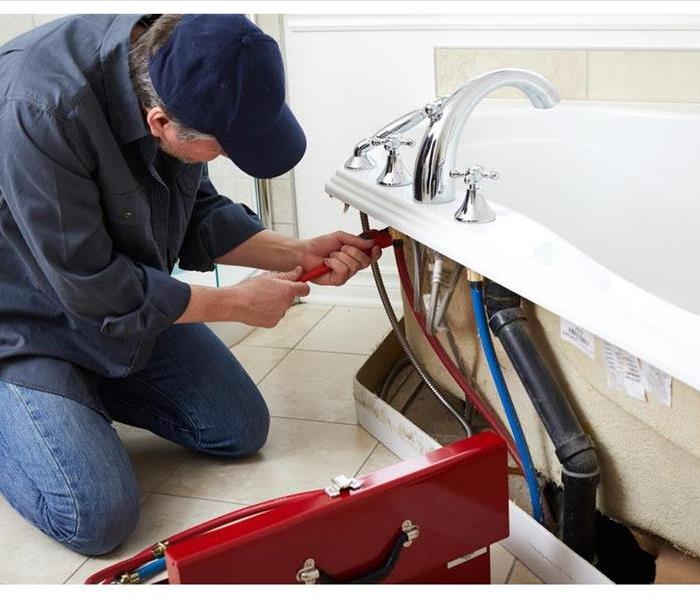Archived Water Damage Blog Posts
Understanding Window Condensation and Its Impact to Your Tri-Cities West Property
11/5/2024 (Permalink)
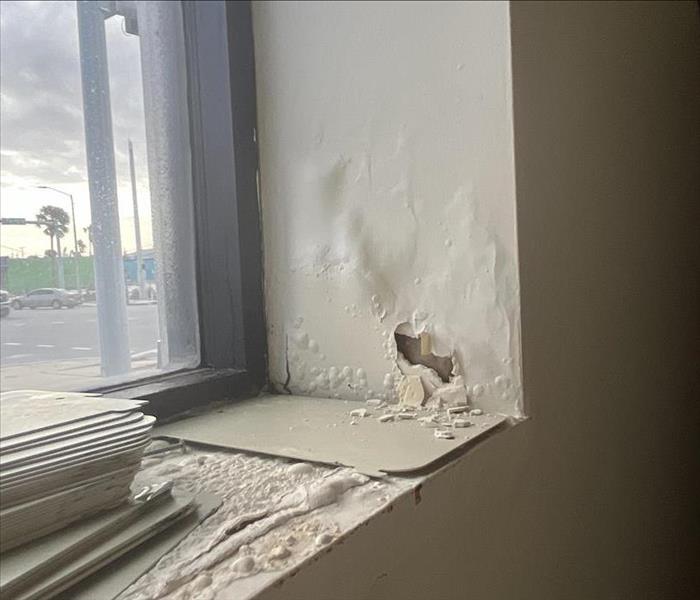 Water Damage From Window Condensation - SERVPRO Tri-Cities West and Franklin County WA
Water Damage From Window Condensation - SERVPRO Tri-Cities West and Franklin County WA
In the Tri-Cities West area, window condensation is a common issue, especially as temperatures drop. While it may seem harmless, condensation can lead to serious water damage if left untreated. SERVPRO of Tri-Cities West is here to help you understand why window condensation occurs, its potential effects, and why prompt mitigation is essential to avoid long-term damage.
Causes of Window Condensation
Condensation forms when warm, moist air inside your home meets the colder surface of your windows. This often happens in the winter months when indoor heating contrasts with chilly outdoor temperatures. Common causes include:
- High indoor humidity: Activities like cooking, showering, and laundry add moisture to the air, which can condense on windows.
- Poor ventilation: Lack of airflow increases humidity and can lead to condensation buildup on windows and other surfaces.
- Improper window insulation: Windows that are not adequately insulated or sealed can exacerbate condensation issues.
Effects of Untreated Window Condensation
If condensation on your windows goes unchecked, it can lead to several issues that may compromise your property:
- Mold Growth: Moisture from window condensation can seep into surrounding window frames, sills, and walls, creating the perfect conditions for mold to thrive. Mold not only damages property but also poses health risks.
- Damage to Window Frames and Walls: Continuous exposure to moisture can warp wooden frames, damage drywall, and weaken structural elements. Over time, this may lead to costly repairs.
- Peeling Paint and Staining: Excess moisture can cause paint to peel and unsightly stains to form around windows, impacting the aesthetic and value of your home.
Why Choose SERVPRO of Tri-Cities West for Water Damage Restoration?
At SERVPRO of Tri-Cities West, we’re equipped to address water damage at its source and restore your home to its best condition. Here’s what we offer:
- Quick Response: We’re available 24/7 to respond promptly to water damage, preventing further issues from developing.
- Comprehensive Moisture Control: Our team uses advanced moisture detection tools and drying equipment to fully mitigate water damage, even in hard-to-reach areas.
- Certified Expertise: Our trained technicians understand the unique challenges posed by condensation and water damage, providing you with effective solutions that last.
If you’re dealing with window condensation or water damage, contact SERVPRO of Tri-Cities West today. Our team is here to protect your property from the risks of moisture and ensure a safe, healthy home.
Addressing Washing Machine Leaks Quickly to Protect Your Tri-Cities West Property
11/5/2024 (Permalink)
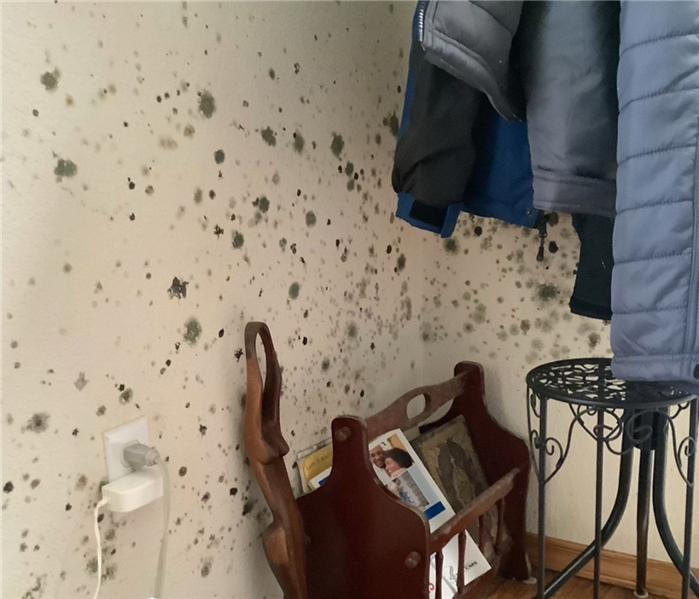 Water Damage Restoration SERVPRO of Tri-Cities West and Franklin County
Water Damage Restoration SERVPRO of Tri-Cities West and Franklin County
In Tri-Cities West, washing machine leaks are a common source of water damage in both homes and businesses. While a small leak might seem manageable at first, it can quickly lead to extensive damage if not addressed promptly. SERVPRO of Tri-Cities West is here to explain the causes, potential impacts, and importance of timely water damage mitigation when dealing with washing machine leaks.
Causes of Washing Machine Leaks
Washing machines can leak for various reasons, some of which may not be immediately obvious. Common causes include:
- Worn-out hoses: Washing machine hoses can degrade over time, leading to small cracks or breaks that result in leaks.
- Overloaded machine: Putting too much laundry into your machine can cause strain, increasing the chance of water escaping.
- Faulty seals: Seals in the washing machine tub can wear out, allowing water to leak out onto your floor.
- Improper installation: Incorrectly installed hoses or connections can result in slow but consistent leaks.
Effects of Untreated Washing Machine Water Damage
Leaving water damage from a washing machine unattended can lead to severe consequences, including:
- Mold Growth: Moisture from a leak creates an ideal environment for mold, which can spread rapidly to walls, flooring, and nearby belongings. Mold not only damages property but also poses health risks.
- Structural Damage: Prolonged exposure to moisture can weaken floors, especially if the washing machine is located on an upper level. Leaks can also compromise drywall and wooden structures, leading to costly repairs.
- Damage to Flooring and Surrounding Areas: Water from a leaking washing machine can seep into flooring, damaging carpets, tiles, or hardwood. If not mitigated, it can extend into surrounding areas, increasing the scope of the restoration needed.
SERVPRO of Tri-Cities West: Your Local Water Damage Experts
SERVPRO of Tri-Cities West understands the urgency required for washing machine-related water damage. We provide:
- 24/7 Emergency Response: Our team is available around the clock to address water damage as soon as it occurs, helping prevent further complications.
- Advanced Drying and Moisture Control: Using specialized equipment, we ensure affected areas are thoroughly dried and dehumidified, minimizing the risk of mold.
- Professional Expertise: Our certified technicians have extensive experience handling water damage from all sources, ensuring your property is restored efficiently and effectively.
If you’re dealing with water damage from a washing machine leak, don’t wait. Contact SERVPRO of Tri-Cities West for prompt, professional water restoration and to protect your home from further damage.
The Silent Threat: How Water Leaks Impact Businesses and What You Can Do About It
3/5/2024 (Permalink)
Water leaks are often overlooked, yet they pose a significant risk to businesses of all sizes. In fact, water leaks are the most common form of loss reported by businesses, and their consequences can be far-reaching. Let's explore the effects of water leaks on businesses and how SERVPRO of Tri-Cities West can help mitigate the damage and minimize downtime.
Water leaks can cause extensive damage to property, including structural damage to buildings, flooring, walls, and equipment. The presence of water can lead to mold growth, compromising indoor air quality and posing health risks to employees and customers alike.
The cost of water damage can be substantial, encompassing repair and restoration expenses, as well as potential fines for non-compliance with building codes and regulations. Additionally, insurance premiums may increase following a water damage claim, further adding to the financial burden on businesses.
Perhaps the most significant impact of water leaks on businesses is the disruption to operations and business downtime. Water damage can force businesses to close temporarily, resulting in lost productivity, missed deadlines, and dissatisfied customers. The longer the downtime, the greater the potential loss in revenue and reputation damage.
At SERVPRO of Tri-Cities West, we understand the urgency of addressing water leaks promptly and effectively. Our team of highly trained professionals is equipped with advanced technology and expertise to handle water damage restoration quickly and efficiently. We offer 24/7 emergency response services to mitigate further damage and minimize business interruption.
In addition to water damage restoration, SERVPRO of Tri-Cities West provides comprehensive mold remediation services to address any mold growth resulting from water leaks. Our goal is not only to restore your property to its preloss condition but also to ensure a safe and healthy environment for your employees and customers.
With SERVPRO of Tri-Cities West by your side, you can rest assured that your business is in good hands. Don't let water leaks jeopardize your business's success—contact us today for fast, reliable, and professional water damage restoration services.
Remember, when it comes to water damage, swift action is crucial. Trust SERVPRO of Tri-Cities West to handle the aftermath of water leaks and minimize downtime for your business.
The List of Who to Call After Storm Damage
11/16/2023 (Permalink)
In the aftermath of storm-induced flooding in your Tri-Cities/Franklin County residence, it's crucial to connect with various professionals and services to address the situation effectively. Below is a compilation of essential contacts to consider:
1. Emergency Services: In cases of immediate threats to safety, such as structural collapse or electrical hazards, reach out to your local emergency services or dial 911 promptly.
2. Insurance Company: Initiate the claims process by promptly notifying your insurance company about the storm damage. They will guide you through the necessary steps and may offer recommendations for reliable restoration services.
3. Water Damage Restoration Company: Engage the services of a professional water damage restoration company, specializing in managing water-related emergencies. These experts can evaluate the damage extent, extract water, dry and dehumidify affected areas, and carry out essential repairs. Additionally, they can assist with mold remediation if required.
4. Electrician: If your home's electrical system is compromised or if you suspect electrical damage, contact a licensed electrician. Refrain from interacting with electrical components or standing water in affected areas until a professional has assessed the situation.
5. Plumber: In cases where flooding results from plumbing issues, such as burst pipes, enlist the services of a licensed plumber. They can repair the source of water damage and prevent potential future problems.
6. Local Authorities: Depending on the severity of storm damage and flooding, inform local authorities, including municipal or county offices, to report the situation and seek necessary permits or assistance.
Always prioritize your safety. In case of evacuation or immediate risks, follow the guidance of local authorities and emergency services. Once your safety is ensured, contact SERVPRO of Tri-Cities West/SERVPRO of Franklin County at (509) 943-9290 for immediate assistance. To learn more, visit our website. Your safety is our priority!
A Comprehensive Guide to Hurricane Preparedness and Recovery
11/1/2023 (Permalink)
As the calendar flips to November, we find ourselves in the last month of hurricane season. it's crucial to remember that while the peak of hurricane activity may have passed, the potential for storms and their aftermath still lingers. This blog post will provide you with valuable information on how to stay safe during this time and what to do if you experience a hurricane or flooding.
Pre-Storm:
One of the most critical aspects of hurricane preparedness is staying informed. Keep an eye on weather forecasts, and if a hurricane or severe storm is expected, monitor updates from reliable sources such as the National Hurricane Center, your local government, and news outlets. Make sure to have a battery-powered weather radio on hand in case of power outages.
Create an Emergency Kit
Having an emergency kit ready can make a world of difference during a hurricane. Include essential items like non-perishable food, water, flashlights, batteries, a first-aid kit, personal hygiene products, and important documents. Don't forget to stock up on any necessary prescription medications and pet supplies if you have pets.
Prepare Your Home
Securing your home is vital to your safety during a hurricane. Reinforce windows and doors, trim tree branches that could become projectiles, and clear your gutters. If you live in a flood-prone area, consider investing in sandbags and flood barriers to protect your property.
Evacuation Plan
If you live in an evacuation zone, be prepared to leave when authorities issue evacuation orders. Have a plan in place for where you will go, and make arrangements for your pets if you have them. It's essential to leave early to avoid traffic congestion and ensure your safety.
Communication
Keep lines of communication open with your family and friends. Make sure everyone knows your whereabouts and how to reach you. Establish a central point of contact in case family members get separated during the evacuation.
Stay Safe During the Storm
During the hurricane, stay indoors and away from windows. If flooding occurs, move to higher ground, and never attempt to drive or walk through floodwaters. The power may go out, so use flashlights instead of candles to prevent fires. Charge your phones and have a portable charger ready to stay connected.
Post-Hurricane Actions:
After the hurricane passes, it's not time to let your guard down. Be cautious of downed power lines, flooding, and debris. Check on your loved ones, especially the elderly and those with special needs. If you evacuated, wait for authorities to declare it safe to return home.
Stay Informed
After the hurricane has passed, continue to stay informed about local conditions and updates. Keep your weather radio or other communication devices handy to receive updates on road closures, emergency services, and relief efforts. This information is invaluable as you assess the situation and plan your next steps.
Contact Loved Ones
Let your friends and family know that you're safe and sound. Keep your cell phone charged and use it to communicate with your loved ones. A simple text message can ease their worries and keep the lines of communication open.
Document the Damage
Take photographs and videos of the damage to your property, both inside and outside. This documentation can be vital when dealing with insurance claims and seeking assistance. Make sure to document any damage to vehicles as well.
Contact Your Insurance Company
Contact your insurance company as soon as possible to report the damage and start the claims process. Be prepared to provide them with the documentation you collected. If you're unsure about your policy's coverage, ask your insurance agent for clarification.
Assess Your Home's Safety
If you're allowed back into your home, assess its safety and the extent of the damage. Secure any openings to prevent further damage, such as covering broken windows and tarping damaged roofs. Take steps to remove water and begin drying out your home to prevent mold growth by calling SERVPRO of Tri-Cities West at (509) 943-9290.
Seek Assistance
If you're in need of immediate assistance, contact local emergency services or relief organizations. They can provide you with information on shelters, food distribution, and medical services. Local government agencies may also provide resources for disaster recovery.
Reach Out to FEMA
In the aftermath of a major disaster, the Federal Emergency Management Agency (FEMA) may offer assistance to affected individuals and communities. Contact FEMA to inquire about the available aid and how to apply for it if you or your family need it.
Begin Cleanup and Repairs
Once your safety is ensured, and you've taken the necessary steps to document and assess the damage, you can call SERVPRO of Tri-Cities West to begin cleaning up and essential repairs. Keep all receipts and records of expenses related to recovery efforts, as these may be important for insurance and assistance claims.
Experiencing a hurricane or flooding can be a challenging and emotional ordeal. However, by following these steps after the storm and calling SERVPRO of Tri-Cities West, you can begin the process of recovery and rebuilding. Remember to stay safe, document the damage, and seek assistance when needed. With the support of your community, the appropriate agencies, and SERVPRO, you can recover from the aftermath of a hurricane and look forward to better days ahead.
Common Sewage Problems
3/9/2023 (Permalink)
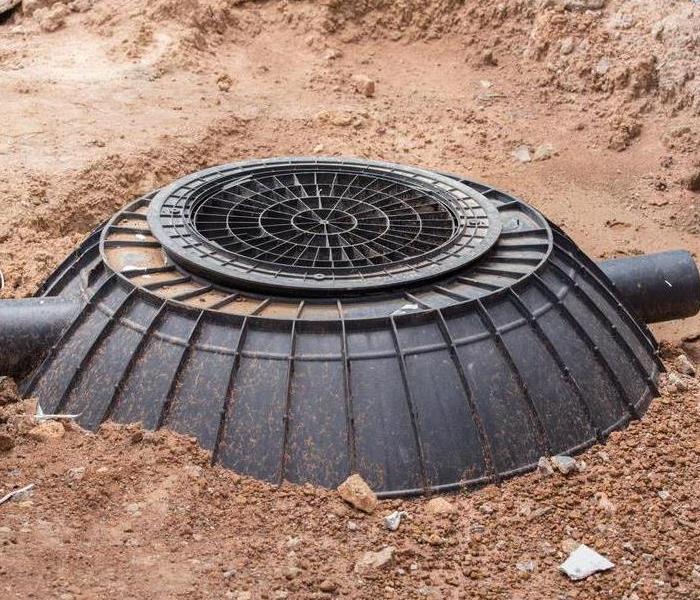 If a sewer problem occurs, give SERVPRO a call at the first sign of water damage
If a sewer problem occurs, give SERVPRO a call at the first sign of water damage
Sewer problems are an unfortunate inevitability in most buildings. The good news is that these problems are usually easy to fix, especially if you catch them early. However, if you don't find them soon enough, it's likely that your sewage system will fail and need to be replaced entirely.
Fallen Trees
If a large tree has fallen on your property and it's blocking your sewer line, you could have a big problem on your hands. The roots of the tree can grow into the sewer line and block it completely. This can cause sewage backup or overflow in your home, which can be extremely dangerous for anyone who lives there.
If this happens to you and you're not sure what to do next or how much damage has been caused by the root intrusion into the pipe system under your property, contact us today! We'll send out one of our experienced technicians who will assess all aspects of this situation so that we can come up with an action plan tailored specifically for you and your unique needs.
Toilet Overflow
The most common reasons for a toilet to overflow are too much toilet paper. If you're like most people, you've probably heard that it's better to use less toilet paper when you go to the bathroom. However, this isn't always true and can actually cause problems if done incorrectly. If your toilet begins overflowing unexpectedly after flushing, try using less paper next time until you find the right amount for your particular type of plumbing system.
Debris clogs in the pipes or sewer line outside of your house may be causing blockages in your plumbing system as well. Debris such as wet wipes and sanitary products should not go down the drain because they don't break down easily--they can clog up drains instead. When taking care of these items make sure they are disposed properly so they don't end up causing problems later on down line either by throwing them away or recycling them instead.
Old Pipe
If you're not sure how old your pipes are, get them checked. If they are older than 40 years, they may be corroded and leaking. This can cause sewage backup in your building.
If you've noticed a foul odor coming from one of your toilets or drains in the past few weeks (or even months), then it's time to call a plumber right away.
Broken Pipes
Have you noticed water in places that shouldn't have any? It could be a broken pipe or line. If you're noticing water where there shouldn't be any, there's a good chance that your building has a problem with its plumbing system. This can cause structural damage and other issues, like mold growth, flooding and more.
Sewage backups can occur when too much water enters your plumbing system at once and overwhelms it. This is more likely to happen if you have an older home or building, as well as if you live in an area that gets heavy rain or snowfall.
There are several things you can do to prevent sewage backups from happening. Check for leaks around faucets and toilets by turning off all sinks and running each fixture individually while watching for drips on the floor below each one. If necessary, replace washers with new ones where needed, you may find them at any hardware store as part of kits designed specifically for this purpose.
If you think your building has any of these problems, it's important to call a professional right away. The last thing you want is for sewage backup or broken pipes to damage or destroy your building and its contents. Give SERVPRO a call at the first sign of sewage damage to your home or business.
Signs of a Shower Leak and What to Do
11/3/2022 (Permalink)
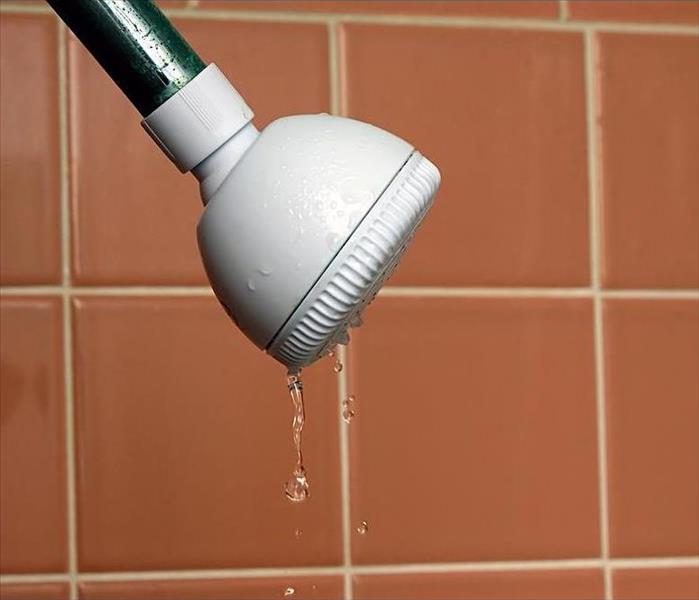 If you have a leak in your shower, it could be caused by any number of things. Call SERVPRO of Tri Cities West/ SERVPRO of Franklyn County.
If you have a leak in your shower, it could be caused by any number of things. Call SERVPRO of Tri Cities West/ SERVPRO of Franklyn County.
Signs of a Shower Leak and What to Do
You've just stepped out of a relaxing shower, and the water is still flowing. You think nothing of it—it's just extra water, right? But what if that extra flow could be an indication of a much bigger problem that leads to costly repair bills and even more frustration? Read on to learn how to detect leaks in your bathroom or basement before they get out of hand.
Inspecting a Drain and Shower Pan
The shower pan is the base of your shower. It's usually made of fiberglass, concrete, or plastic. The drain and valve are connected to it so that water drains away from your house when you use the shower. Shower pans can be damaged by water, mold, or rust.
To inspect for a leak, you should start by looking at the shower drain. If you notice water stains on the ceiling or walls in your bathroom, this is an indication that there may be a leak in your drain.
If you think something might be wrong with your shower pan, it's also important to check that area as well. You can find out if there are any leaks by using a pool tester—essentially a tube filled with black dye and chalk that detects moisture when placed against an object.
If you have a leak in your shower, it could be caused by any number of things: a cracked floor tile; corrosion on piping joints; or maybe even a burst pipe! If you suspect there's an issue with your plumbing system in your Franklin County home, call SERVPRO of Tri Cities West/Franklin County today!
Calling a Professional
If you're not sure whether or not you have a leak, don't be afraid to call a professional. Your first step should be to take your time and look around the room. Look for small puddles of water on the floor and feel along walls for dampness and mold growth. If this doesn't work, it's time to call in an expert.
There are many reasons why a professional damage restoration expert or plumber may be needed:
- if you can't find the leak
- if there is a leak coming from behind a wall
- if there is no visible evidence of where the leak is coming from
- if your attempts at fixing it yourself have failed (or are too difficult)
Act Quickly
If you ignore the problem, it can lead to serious consequences. Water damage is one of the most common results of a leaky shower. The constant moisture can cause mold growth and insect infestation, as well as wood rot or rust on fixtures like pipes and faucets. If you notice any water damage around your house, it's important to get it addressed immediately so that it doesn't become an even bigger issue down the road!
Tips for Preventing Shower Leaks
To prevent leaks in your shower, you should:
- Perform regular maintenance on your shower pan. This includes checking for any cracks or chips in the tile and fixing any that are found.
- Make sure you have a drain cover designed to fit over your drain. A good choice would be a grated drain cover made out of stainless steel or fiberglass, which will help prevent clogs from hair and soap scum buildup while also allowing water to flow freely through the grate without damaging it or causing other problems with drainage flow rates and pressure levels when used as directed by manufacturer recommendations (i.e., keep at least 1” away from walls).
- Make sure that your drain is properly aligned. This will make sure it drains correctly, leading away from where water could leak into another part of your house.
Water Damage Can be Expensive
Water damage caused by a leak or malfunctioning drain or valve can be expensive to fix. If you ignore a leak, it can cause more damage than if you had fixed it right away. This is why it’s so important to know what to look for when inspecting your shower pan. Look at the floor around the base of your shower curtain rod. If there is any evidence that water has seeped through the subflooring and onto the carpet underneath, there may be a problem with your drain assembly or some other system in place below your shower pan.
The most important thing to remember is that your home is your castle. If there’s something wrong with it, you want to know about it before it becomes a serious problem. Don’t put off investigating any signs of water damage—it could lead to much more expensive repairs down the road!
Tips for Sewage Cleanup
4/5/2022 (Permalink)
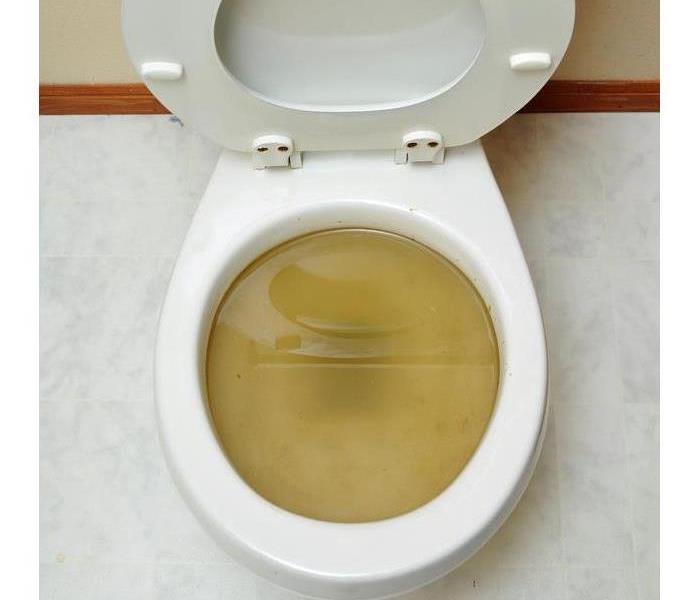 No one expects to find their home flooded from a simple flush of the toilet, but occasionally such problems do occur.
No one expects to find their home flooded from a simple flush of the toilet, but occasionally such problems do occur.
Sewage Cleaning Suggestions
No one expects to find their home flooded from a simple flush of the toilet, but occasionally such problems do occur. Sewer cleanup experts in Kennewick, WA, assess the problem in your home and take the appropriate steps to get it back to normal again.
Identify the Source
The source of the water informs the entire cleaning process, so identifying where it came from is typically the first objective. Water from a sewer backup requires a more intense cleaning process because it is likely contaminated with various substances that you don't want to remain in your home:
- Bacteria or other microbes
- Feces
- Harsh chemicals
Remove Water and Materials
Before they can disinfect the area, technicians must remove the excess water and any materials that it has destroyed. This may include tiles, drywall or any other porous materials that cannot be salvaged. It's important to tear out damaged materials so that secondary problems such as further saturation or mold growth don't set in and spread.
Disinfect Affected Spaces
A key step in sewer cleanup is making sure the bacteria from the backup are eradicated. Specialists use strong cleaners to get rid of any microorganisms that remain. To get the cleaning solution into some of the smaller cracks and crevices, they may need to use special equipment. After a thorough cleaning, the specialists test the area to ensure that the microbes are gone.
Restore the Room
The whole area around the flooded toilet must be cleaned and dried, but the remediation process isn't complete until everything is back in place. New walls and flooring that match the existing patterns are installed. The issue that caused the toilet to back up in the first place must be resolved so that there are no more issues.
The sewer cleanup process is pretty straightforward, but it's important that no step is skipped. Experienced specialists complete the process as efficiently as possible.
Watch For the Hidden Signs of a Leaky Bathtub or Shower
1/13/2022 (Permalink)
Keep An Eye Out For The Signs Of A Leaky Bathtub Or Shower
If you are like many citizens of Finley, WA, you love to take a relaxing bath or shower. If you have a leak, however, your otherwise calming bath could turn into a nightmare. Fortunately, you do not have to wait for a shower or bathtub leak to sneak up on you.
Understanding the Consequences of a Bathroom Leak
As you probably know, bathroom leaks can cause a mess. You may not realize, though, that leaks often contribute to extensive damage inside your home. Specifically, following a bath or shower pan leak, you may notice damage to the following areas:
- Tile
- Drywall
- Fixtures
- Subflooring
- Paint
- HVAC systems
Finding Hidden Bathroom Leaks
When there is water on the bathroom floor, a leak can be easy to identify. Hidden leaks, however, often take weeks, months or longer to show themselves. As such, you must watch for some warning signs to know you may have water in place it isn’t supposed to be. Specifically, keep an eye out for the following:
- Mold growth
- Musty odors
- Floor weakness
- Stains
You may also not realize you have a shower or bathtub leak until you open your monthly utility bills. If your water bill spikes despite normal usage, you could have a hidden water leak somewhere in your home.
Repairing Water Damage
If you catch a bathroom leak immediately, you may only need to stop the leak and wipe up excess water. For leaks that last more than a few hours, however, damage may be extensive. To be certain your bathroom returns to its pre-leak condition, consider working with an experienced flood-mitigation technician. Specialists have the knowledge and equipment to identify leaks, clean belongings and repair damage.
You don’t want to ignore a shower or bathtub leak. While finding hidden leaks can be challenging, watching for their warning signs is usually worth the effort. With a bit of work, you can likely repair leaking fixtures and mitigate water damage.

 24/7 Emergency Service
24/7 Emergency Service





